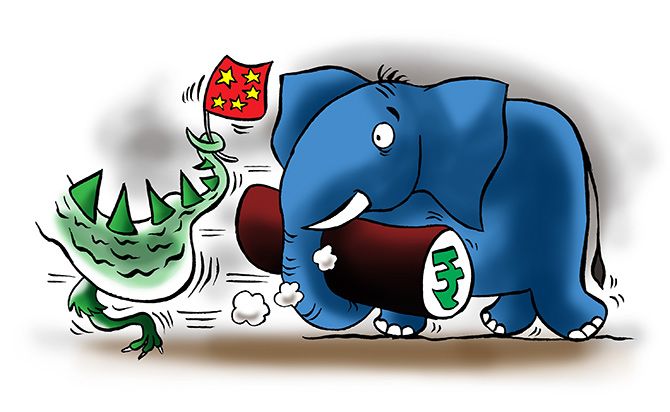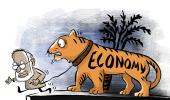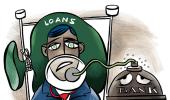'When I came here in 2002, I said you can grow at 8%.'
'And I was told that was crazy, and (now) here we are.'

Illustration: Uttam Ghosh/Rediff.com
Kenneth Rogoff, professor of economics at Harvard University and former chief economist at the International Monetary Fund, believes that the best of central banks could be hobbled by a lack of political backing.
This could play a critical role in handling the next crisis, which he believes may come sooner than one expects.
Speaking to Sachin P Mampatta, on the sidelines of an ICICI Lombard General Insurance Company event, Professor Rogoff discusses demonetisation, the independence of central banks, and the problem with "generals fighting the last war rather than the next one".
You have suggested that the next financial crisis may happen sooner than later. What do you think might trigger it?
There have been many good changes that have taken place. The banking sectors across the world take less risk, have more liquidity and are more tightly regulated.
But there are still many risks in the system.
Financial crisis often results from what you don't see rather than what you do see. Generals tend to fight the last war, not the next one.
I think what concerns me the most is not so much the risk that something will be sparked as weakness of the people who would be dealing with it.
The central bankers are very good. They are very good at the Federal Reserve, they are very good at the European Central Bank, but they cannot deal with crises alone.
They need power.
When (European Central Bank President Mario) Draghi said 'Whatever it takes,' he only could say that when (<en) Merkel said that he could.
When (then US Federal Reserve Ben) Bernanke was freely buying government debt, he could only do that when the US treasury said, 'Please do that.'
And, they could only say that when the (US) president said that.
You need political support at many levels.
Often a problem needs to be dealt with creatively.
There's not always a playbook which you can follow.
And, I just don't know who the adults in the room will be when it happens.
There has been a debate in India about the independence of the central bank. How big a role would you think that might play, as far as emerging markets like India are concerned, during the next crisis?
I wrote the academic theory of independent central banks in the mid-eighties.
So, I think it's very important.
I think the development of India's inflation targeting framework has been a huge step towards stabilisation in India -- to the extent that there are concerns about the independence of the Indian central bank (in the context of Dr Urjit Patel stepping down as RBI governor).
That's a step backwards.
I don't know what the reality is, but certainly from the outside world it didn't look good.
These things have happened in other places, and if they continue their inflation-targeting framework, and continue doing what they are with bankruptcy, it should all be fine.
But when you have not just a crisis, but a recession, the central bank's credibility is incredibly important.
I think it's been one of the great institutional developments of the last 30 years.
All over the world, there were very few independent central banks and now I think they are here to stay.
What's your perspective on demonetisation two years after the experiment?
My colleague Gita Gopinath has a paper on this.
Her results are similar but a little stronger than what others have found, which is that the short-run costs were significant to the economy.
In my book about reducing cash, I'm actually very cautious to say, first of all, if you're an emerging market be very careful about doing this.
You shouldn't do it overnight.
You should take five to seven years.
I think on its own, its hard to understand.
If you look at it in the larger context of other reforms that the government's made -- anti-corruption, the GST (goods and services tax), the bankruptcy changes, the Aadhaar system -- there have been many good things happening.
Demonetisation is more of a political event, but it's not in line with how I would have advised doing it, had someone asked me.
But nobody did.
You've talked about the need to phase out large denomination currency.
Of 50 to 100 dollars... which you didn't have in India.
The (demonetised) notes were worth 7 to 15 dollars at that time.
It's certainly true that when you can move the economy towards becoming cashless, you'll reduce corruption and increase tax collection.
I think the spirit of that is right. But on the tactics, I'm not in charge of governing a country of 1.3 billion people and (don't) understand all the issues.
But it's certainly not the way demonetisation is done; it was done hyper-fast.
My book says do it very slowly.
India is an emerging market and my book says this is for advanced countries.
Global central banks are expected to tighten the screws now. How do you see emerging markets like India being affected by it? We've seen the Reserve Bank of India cutting interest rates by 25 basis points. Is that the direction you would expect to see, broadly, in terms of emerging markets, during a period of tightening liquidity globally?
I don't know when the tightening of liquidity is going to happen because the Federal Reserve did a sudden about-face, it's almost incomprehensible.
It was as if they had put their foot on the accelerator and then slammed on the brakes.
I don't know what's going on. They don't seem to be tightening.
The ECB (European Central Bank) doesn't seem to be tightening.
Japan doesn't seem to be tightening.
So, I think this idea that we are in a global tightening cycle is on pause.
As a result, there is less pressure on emerging markets.
It's very helpful.
Dollar tightening, especially, is very painful for all emerging markets.
It puts pressure on exchange rates, it puts pressure on trade.
And, I think it's a significant relief.
But I'm not sure that the Federal Reserve left itself in a good position if there is inflation.
Then suddenly, they might have to press on pushing rates up even faster than they did before.
So, we've created a vulnerability possibly leading to a faster stop later.
Any views on the Indian economy?
Well, it's the fastest, one of the best performers in the world.
When I came here in 2002, I said you can grow at 8%.
And I was told that was crazy, and (now) here we are.












 © 2025
© 2025